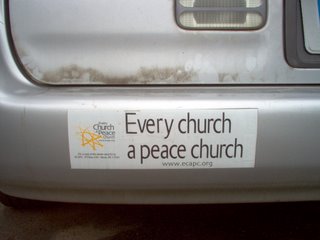Bumper Sticker Politics
 Two months ago, Kwakersaur posted a link to an organization I'd never heard of -- Every Church a Peace Church. Two months ago, also, Tom Fox died in Iraq for asserting pacifist beliefs in a war situation. At the same time, while many churches openly supported the peace effort, too many condemned it. I was dismayed at the lack of peace orientation in Christian churches. Tom's giving of his life made me consider becoming more assertively pacifist.
Two months ago, Kwakersaur posted a link to an organization I'd never heard of -- Every Church a Peace Church. Two months ago, also, Tom Fox died in Iraq for asserting pacifist beliefs in a war situation. At the same time, while many churches openly supported the peace effort, too many condemned it. I was dismayed at the lack of peace orientation in Christian churches. Tom's giving of his life made me consider becoming more assertively pacifist.So, if you've been following this blog at all, you'll know I've been writing letters to church leaders asking about their peace orientation. The replies have died off, so I'm assuming I won't be hearing from any more of them. Pope Benedict appears to have declined to reply. I'm crushed.
I contacted this organization Every Church a Peace Church and asked for a bumper sticker. Fortunately for me, they sent two, because the bumper sticker read: "Is your church a peace church?" instead of what you see in the picture. That's just a little too in-your-face for Canada. Or maybe it was just a little too assertive for me. Confrontational, even accusatory. I dunno - I wasn't comfortable with it.
So I cut-and-paste letters from one bumper sticker onto the other to make the current message, whichto me reads more like an idea or a query, something to think about or wish for. A wouldn't-it-be-great-if message or a how-it-should-be message. Getting the letters to line up was a bit of a trick, but it doesn't look too bad from here. I covered it all with clear mack-tack to hold it all in place.
And for the first time in my life, I put a bumper sticker on my car.
It seems like such a small gesture. Slack-tivism, as a friend of mine calls it. "It's the least I could do." Very literally.
But there it is on my car for all the world to see. My neighbours, my friends, dog walkers, shoppers. It's like I'm outed as a pacifist.
Every time I see it, I'm taken aback. It's as if I'm not used to it. I return to the parking lot, key in hand, and then I see it.
Bumper sticker.
For a second, I'm always surprised. Who put that there? I feel naked.
This is an army town. It's also a university town. There is one soldier in our Meeting, who served in Rwanda (and another from upstate NY who sneaks across the border to come to Meeting occasionally -- we don't even know his phone number).
My son's Cub leaders are ex-military. They would have seen my car by now. They're nice people. What do they make of it? Do they think I'm a nutcase? They always smile and talk very nicely to me. Is that for real, or is it because they've read the bumper sticker and want to show that they're open-minded?
It's been on my car for a few weeks now. Nobody has even mentioned it, not even my next-door neighbours, who are very kindly and chatty. Do people feel embarrassed by it? Are they afraid to mention it to me in case I go on a tirade?
I can't hide it because it's there.
Bumper sticker. Read who I am in five words or less.
It doesn't go away now. I need a special soap to remove it.
On the outside, I feel uncomfortable, nervous, apprehensive. But on the inside, deep down, something somewhere is dancing.
